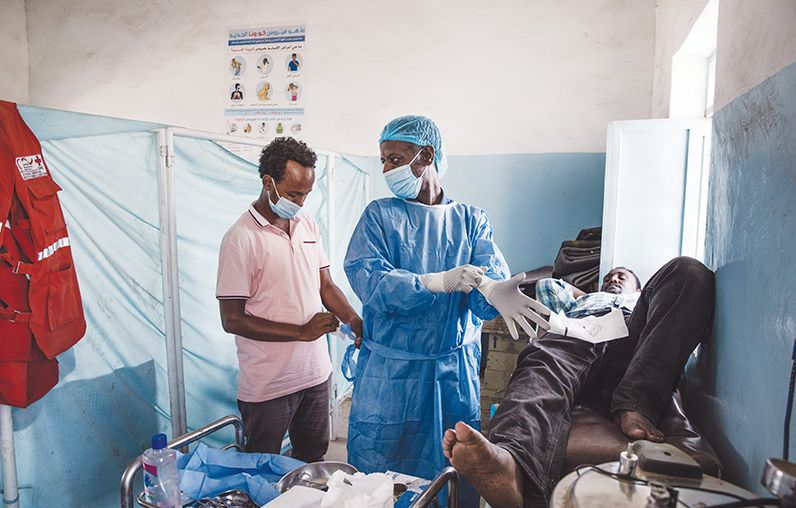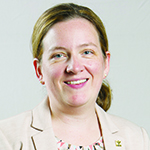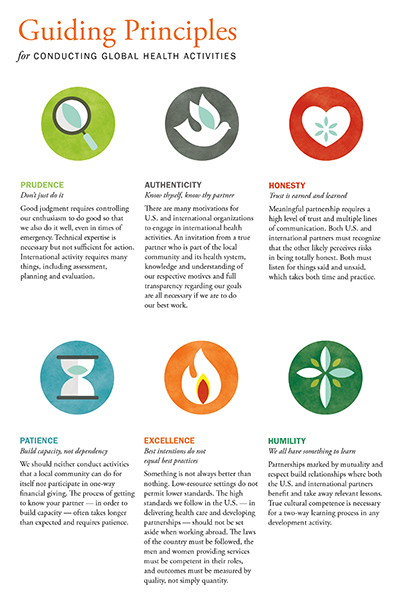
A surgeon prepares to operate on a man's severely infected toe inside the Sudanese Red Crescent Clinic in eastern Sudan in 2021. Sudan is on the watch list that the World Health Organization keeps of nations that are especially stressed by health
care worker shortages. Photo by Nariman El-Mofty/Associated Press
If a hospital in a wealthy nation like the United States can't find health care workers in its own country, why not recruit them from low- or middle- income countries?
It's a seemingly simple solution, but one that a CHA research paper warns has the potential for unintended consequences.
While recruiting health care workers from other countries isn't new, it has rapidly accelerated in recent years. That prompted CHA to release a discussion paper outlining the ethical considerations and repercussions of luring skilled staffers from countries
facing considerable needs themselves.
"The Future of Health Workforce Discussion Paper: Insights and Opportunities to Transform International Health Workforce Recruitment and Capacity" was researched and written to help sponsors and executives as they talk about and discern the topic as well
as how to respond as members of the Catholic health ministry. It was released last year and is available at chausa.org/globalhealth.
Among the specific concerns the paper raises are:
- The world is projected to have a shortage of 10 million health care workers by 2030.
- A growing dependency by wealthy nations on poorer ones for medical workers "is driving dangerous depletion of health care capacity for the most poor and vulnerable countries."
 Compton
ComptonBruce Compton, CHA's senior director for global health, noted that the motivations for writing and promoting the paper align with CHA's vision statement, "We will empower bold change to elevate human flourishing."
"I think our new vision statement is very relevant to this conversation," he said. "Human flourishing doesn't happen (just) in the United States. Human flourishing is about all of us."
The paper notes these themes apply to the world's higher economies including the United Kingdom, Italy, Germany, Canada and Australia.
CHA's Working Group on Global Health Workforce for the Future collaborated with the global consulting company Accenture to produce the paper. The work included reviewing literature and interviewing more than 30 people from high-, medium- and low-income
countries. Many were associated with the Catholic health ministry.
 Grippon
GripponCamille Grippon, system director of global ministries for Bon Secours Mercy Health, is the chair of the working group.
"I began the project thinking and believing everybody knows this is an issue but since we really need staff on the ground, we are forced to recruit from anywhere we can," she said. "A lot of people I shared this with had no idea of the depth of the issue.
I think it's good that we brought awareness."
Challenges here and abroad
Challenges such as the COVID-19 pandemic, burnout, workplace violence, recruitment issues, and lack of instructors to train health care workers have depleted the workforce pipeline here and abroad, the paper
notes. But while the need to recruit workers continues to grow, that may put more countries at higher risk for not being able to attend to their own workforce and health needs.

The paper cites the example of the more than 150,000 nurses from the Philippines that have been recruited for jobs in the United States since the 1960s. The paper notes the Philippine Nurses Association recently raised concern about the nation's ability
to provide essential care to its own citizens. The Philippine government has considered emergency responses like scholarships and incentives to get nurses to stay.
Compton noted that because of the shortage, hospitals in the Philippines have allowed unlicensed nurses to start practicing there.
"Our solutions can't be creating other people's problems, because eventually they'll become our problems again," he said.
Despite the concerns about its health care workforce, the Philippines isn't on a watch list the World Health Organization keeps of nations that are especially stressed
by the shortage and in need of safeguards. Those countries "are experiencing some of the world's lowest health care workforce density numbers," the paper said. The group added eight countries to the list in March 2023, bringing the total to 55. Many
are in Africa.
Working toward solutions
As awareness of the worker shortage grows, some countries have agreed to help one another. A partnership between the Irish Health Service Executive and the Ministry of Health in Mozambique focuses on exchanging
knowledge, training and improving local resources. Because of this agreement, maternal mortality has decreased by as much as half in some parts of Mozambique, the paper says.
The paper also highlighted the Tropical Health and Education Trust, an organization based in the United Kingdom that partners with and trains health workers in Africa and Asia.
Recruiting and aiding workers domestically, including upskilling unlicensed hospital staff, providing flexible staffing and supporting the mental health and well-being of staff can help workers stay, the paper says.
The paper notes that "Catholic health will always support humane and people-led migration of health care workers that is mutually beneficial to the origin countries." But it adds: "What we must collectively address and reexamine is the ethics of international
recruitment practices, so that we can practice responsibly for global health care capacity and resilience."
The paper suggests many ways to address the brain drain from poorer nations. Groups can help bolster and reinforce education in countries where many potential workers drop out of school because of lack of funds. Health care systems can use recruiting
agencies that promote ethical and sustainable practices and establish accountability for those agencies. They can establish a training fund for sender countries and develop long-term, reciprocal partnerships with them. They also can look at their
definition of "ethical" and expand it to take on a more globally inclusive approach.
"My hope is that we begin to see the U.S. as part of the broader global community," said Grippon. "Unfortunately, it's been my experience in 20 years of global health work that the U.S. sees itself as the U.S. and the rest of the world is the rest of
the world. I want people to take away that your actions at home have an implication abroad."
"Reflecting on the Interconnectedness of the Global Health Workforce: What Can Your System Do To Bolster the International Workforce?" in the Winter 2024 edition of Health Progress includes member viewpoints on ethical practices in international recruitment.